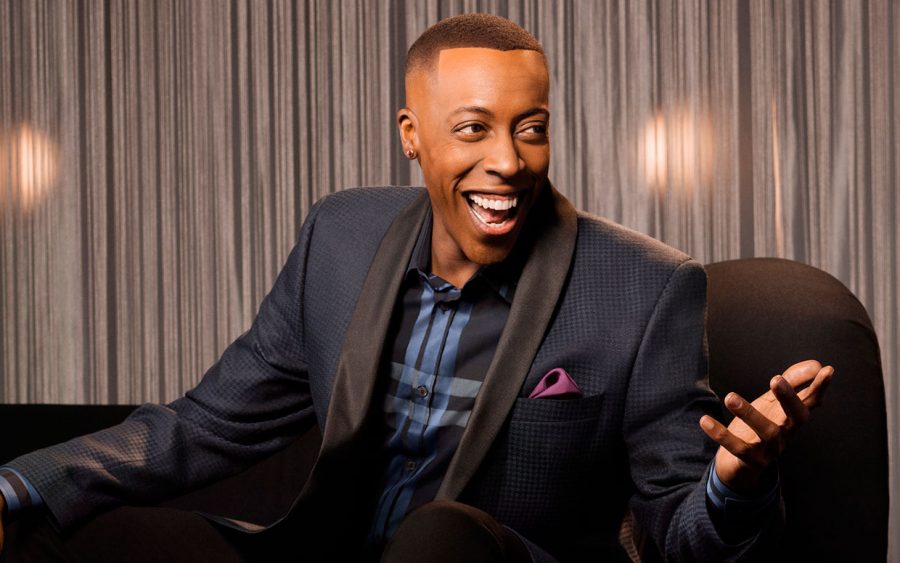The Interview
by Bill Singleton
Q: When did you decide to be a comedian?
AH: When I was a senior in high school, a comedian named Franklin Ajaye came to my school to promote the film “Car Wash.” After seeing him, I said to myself, that’s the first thing I’m going to try when I get out of school.
Q: Was your family supportive of your decision to pursue a career as a performer?
AH: Yes, until it got serious. I guess they felt, “Just leave him alone and it’ll go away. He’ll grow up to be a preacher or a lawyer and everything will be all right.” And that’s pretty much what I thought, too. But then I began watching “The Tonight Show.” I was always in trouble because my mother would wake up, come in my room and find me with the TV on at midnight. I could never figure out how she knew. I later realized she saw the blue light coming out from under the door. But it didn’t matter, I just had to watch, particularly if the Mighty Carson Art Players were doing something. That was the “Saturday Night Live” of that era. Then one day (I was about 12) I told my mother, “You know, Mama, what would be really cool? If one day I could fill in instead of David Brenner.” Then as I got older, I remember seeing Della Reese fill in for Johnny. Now, that really did something for me, because it made me realize that by the time I was grown, a Black person might have the opportunity to do something like that.
Q: Is there a comedian you most admire?
AH: There are a lot of people I like out there, but there is nothing like the consummate Richard Pryor. He is, I think, the best.
Q: What kind of comedy to you like?
AH: I like to watch a good impressionist. I also like people who are a lot different from me. So I like to watch people on the edge, like Bob Goldthwait.
Q: How do you describe your style of comedy?
AH: You see, I’m a pretty average, normal, clean cut-looking guy-no wild hair or anything-and often in a suit. But sometimes I get this boyish-like badness and say things people wouldn’t expect me to say, looking the way I do. The audience will accept it, though, because I look like them. Now, obviously, I can’t use the term “white bread” to describe myself, so I’d have to say I’m ” ‘brown bread’ on the edge.”
Q: You have a successful career in both film and television. Do you prefer one medium over the other?
When I told Eddie (Murphy) that I wasn’t going to do TV anymore, he told me I was crazy. at one point, he said,” I’ll even produce the show if you do it.”
AH: Television, despite the fact that most of my friends and colleagues tell me to do film-all except Eddie [Murphy]. When I told Eddie that I wasn’t going to do TV anymore, he told me I was crazy. At one point, he said, “I’ll even produce the show if you do it.” Of course, I wound up producing it myself.
Q: Why do you prefer television?
AH: Film and television both have their advantages. Film gives you a certain kind of creativity, but you have to wait a year to see whether people enjoy it. Television is more timely. For instance, when Dan Quayle was accepted as the vice presidential candidate for the Republican Party, I almost cried, not being able to do a monologue about it. Every time you see a news item you’re thinking of jokes. When I did “The Late Show” I wrote my own monologues for more than 60 shows. A talk show is a blessing for a stand-up. It’s the perfect vehicle.
Q: When did you decide to do this show?
AH: It’s strange-I made the decision while on the Carson show promoting “Coming to America.” During the commercial breaks we began talking about my work on “The Late Show” and hosting talk shows in general. It was like discussing a mutual girlfriend we had both dated. I started missing “her” and I had to have “her” back. And when the show was over Johnny went home and I went to call my manager.
Q: How would you describe your new show?
AH: The show will have a different feel and approach than what most viewers are accustomed to. It will reflect a lot of my sensibilities and interests. In looking at earlier talk shows, the only thing I didn’t like was they didn’t reflect society as I saw it. When I look at society, I see all different kinds of people-the kind of people I didn’t see on Carson, Griffin, Mike Douglas and the like. So I’m hoping my show will offer a more diverse group of guests.
Q: What is the format of the show?
AH: The show will be very unstructured. There’s going to be a feeling of spontaneity and unpredictability. One thing is certain: I won’t be sitting behind a desk. I think body language is very important in communicating and a desk just gets in the way.
Q: Will you have an Ed McMahon type on the show?
AH: We’ll have an announcer, but not in terms of a “second banana.” Of course, personalities often emerge as shows develop and that’s fine, too. We’ll have to wait and see.
Q: For whom is the show targeted?
AH: Probably 18 to 49. But I’m surprised at how many times older folks have come up to me to say they watched me on “The Late Show.” I had a lady on the plane tell me she loved my show. I was surprised and told her so, but she told me she liked the fact that I often had guests on from her generation as well as younger talents. She also said the show helped her better understand her grandchildren.
Q: You are serving as executive producer as well as host. Are you enjoying that role?
AH: Yes, definitely. It gives me the kind of control I need to build this show. It’s my own custom design. I do have to worry about things I didn’t worry about before-like the budget. Now I find myself putting the brakes on spending when necessary. I’ve worked very hard all my life to educate myself, and now I get a chance not only to show the funny side of my personality, but the businessman locked inside me as well. A very wise man told me when I was young that “show business” is two words, and the second is a much larger word. If this show succeeds, there will be nothing greater than hearing someone say, “Arsenio Hall is a great businessman.”
Q: How do you answer those who say, “There’s no room for another late-night talk show?” And, is Carson the target?
AH: I think there is room for my show. I know a lot of people who don’t watch Carson, so maybe I can offer them an alternative. So, no, Carson is not a target for me. He’s a legend and I admire him.
Q: Do you set goals for yourself?
AH: Yes. I want to be an artist respected by other artists, which I don’t think I’ve achieved yet. That bothers me sometimes. I want a person to look at me and be affected by my work, like I’m affected when, for example, I see James Earl Jones in “Fences.” I’d like people to look at me and say the things that I say when I watch Letterman. And I’m going to keep working until I do it right.
Q: What was your childhood like, growing up in Cleveland?
AH: My father was a Baptist preacher, so when I was young I spent a lot of time in church at weddings and funerals. It’s weird, when a kid talks about going to work with dad, it’s usually a business office or a factory; but my dad’s office was at the church. I remember sitting in the pulpit behind him during his sermons. He was a brilliant orator, very articulate. That’s the one thing I probably inherited from him-the ability to work a crowd. It’s interesting, if you close your ears and look at the physicality, my dad is the character in “Coming To America.” The rocking, swaying, the hand waving and the handkerchief, I absorbed all that from him.
Q: You’re a magician as well as a comedian. How did you become interested in magic?
AH: I guess most kids had a paper route and mowed lawns to make a little money, but I was allergic to grass, so I did magic. It worked well because my dad would do weddings and I would do magic at the reception-a great package deal. I also did a lot of birthday parties and talent shows around the city. I even made a little money doing magic while I was at Kent State. Until I was 15, I guess I thought I would be what David Copperfield is today.
Q: You have an extensive stuffed animal collection. Tell us about it.
AH: The Christmas that I was nine, my parents had divorced and we were short of money. My mother bought me a little stuffed dog for Christmas, and I was upset because I wanted a Hot Wheels set, an Etch-a-Sketch and an Uncle Martin Magic Kit from the series “My Favorite Martian.” So she sat me down and explained to me what Christmas was all about. She told me about how it’s about love and thought behind the gift that matters, not the money. I still have that dog, and now I can have any stuffed animal I want. It makes me remember where I came from.

